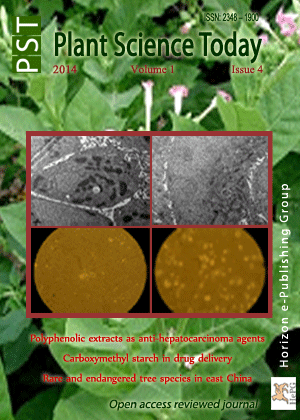Taxonomy of the Truffles
DOI:
https://doi.org/10.14719/pst.2014.1.4.55Keywords:
truffles, ascomycetes, fungiAbstract
Truffles are the hypogeous fruiting bodies of Ascomycete fungi that live in symbiosis with roots of trees such as oaks, hazels, poplar, etc. Due to limited morphological characters, these fungi are difficult to identify at species level. Molecular phylogenetic studies have recently demonstrated that morphological characters of hypogeous Ascomycetes can be unreliable.
Downloads
References
Amicucci, A., Zambonelli, A., Giomaro, G., Potenza, L., & Stocchi, V. (1998). Identification of ectomycorrhizal fungi of the genus Tuber by species-specific ITS primers. Mol. Ecol., 7, 273-277. doi: 10.1046/j.1365-294X.1998.00357.x
Ammarellou, A. Saremi, H. and Gucin, F. (2007). Evaluation of morphology, cytology and mycorrhizal relationships of desert truffles in Iran. Paki. J. Bio. Sci., 10, 1486-1490. doi: 10.3923/pjbs.2007.1486.1490
Awameh, M.S., Alsheikh, A., and Al-Ghawas, S. (1979). Mycorrhizal synthesis between Helianthemum ledifolium, H. salicifolium and four species of the genera Terfezia and Tirmania using ascospores and mycelial cultures obtained from ascospore germination. Proc. 4th North Amer. Conf. Mycorrhizae, Colorado State University, Forth Collins (USA).
Buscot, F., Wipf, D., Di Battista, C., Munch, J. C., Botton, B. & Martin, F. (1996). DNA polymorphism in morels: PCR/RFLP analysis of the ribosomal DNA spacers and microsatellite-primed PCR. Mycological Reseurclz, 100, 63-71. doi: 10.1016/S0953-7562(96)80101-8
Cameleyre, I. & Olivier, J. M. (1993). Evidence for intraspecific isozyme variation among French isolates of Tuber melanosporum Vitt. FEMS Microbiol. Lett. 110, 159-162. doi: 10.1111/j.1574-6968.1993.tb06313.x
Ceruti, A., Fontana, A. & Nosenzo, C. (2003). Le specie europee del genere Tuber. Una revisione Storica. Monografie XXXVII. Regione Piemonte, Italy.
Chillali, M., Wipf, D., Guillaumin, J. J., Mohammed, C. & Botton, B. (1998). Delineation of the European Armillaria species based on the sequences of the internal transcribed spacer (ITS) of ribosomal DNA. New Phytologist, 138, 553-561. doi: 10.1046/j.1469-8137.1998.00124.x
Corocher, N., Polimeni, C., Giraudi, G., & Papa, G. (1992). Sviluppo di un metodo immunoenzymatico (ELISA) per la caracterizzazione di ectomicorrize di Tuber magnatum e T. albidum. Micol. Veg. Mediterr., 7, 151-158.
Diez, J., Manjon, J. L. & Martin, M. F. (2002). Molecular phylogeny of the mycorrhizal desert truffles (Terfezia and Tirmania), host specificity and edaphic tolerance. Mycologia. 94(2), 247–59. doi: 10.2307/3761801
Dupre, C. & Chevalier, G. (1991). Analyse electrophore’tique des prote ines fongiques de diffe’rents Tuber en association ou non avec Coryllus avellana. Cryptogamie Mycol., 12, 243-250.
Ferdman, Y., Aviram, S., Roth-Bejerano, N., Trappe, J. M., & Kagan-Zur, V. (2005). Phylogenetic studies of Terfezia pfeilii and Choiromyces echinulatus (Pezizales) support new genera for southern African truffles: Kalaharituber and Eremiomyces. Mycol. Res., 109, 237-245. doi: 10.1017/S0953756204001789
Gandeboeuf, D., Dupre, C. & Chevalier, G. (1994). Diffe’renciation des truffes Europe’ennes par l'analyse des isoenzymes. Acta Bot. Gallica. 141, 455-463. doi: 10.1080/12538078.1994.10515183
Gandeboeuf, D., Dupre, C., Roeckel-Drevet, P., Nicolas, P. & Chevalier, G. (1997). Grouping and identification of Tuber species using RAPD markers. Can. J. Bot., 75, 36-45. doi: 10.1139/b97-005
Gardes, M. White, T. J., Fortin, J. A., Bruns, T. D. & Taylor, J. W. (1991). Identification of indigenous and introduced symbiotic fungi in ectomycorrhizae by amplification of nuclear and mitochondria1 ribosomal DNA. Can. J. Bot., 69, 180-190. doi: 10.1139/b91-026
Halász, K., Bratek, Z., Szego, D., Rudnoy, S., Racz, I., Lasztity, D. & Trappe, J. M. (2005). Tests of species concepts of the small, white, European group of Tuber spp. based on morphology and rDNA ITS sequences with special reference to Tuber rapaeodorum. Mycological Progress, 4, 281-290. doi: 10.1007/s11557-006-0132-6
Hansen, K., Lassoe, T. & Pfister, D. H. (2001). Phylogenetics of the Pezizaceae, with emphasis on Peziza. Mycologia, 93, 958-990. doi: 10.2307/3761760
Harley, J. L. & Smith, S. E. (1983). Mycorrhizal Symbiosis. Academic Press. London.
Henrion, B., Chevalier, G., & Martin, F. (1994). Typing truffle species by PCR amplification of the ribosomal DNA spacers. Mycol. Res., 98, 3743. doi: 10.1016/S0953-7562(09)80333-X
Henrion, B., Le Tacon, F. & Martin, F. (1992). Rapid identification of genetic variation of ectomycorrhizal fungi by amplification of ribosomal RNA genes. New Pzytologist, 122, 289-298. doi: 10.1111/j.1469-8137.1992.tb04233.x
Hillis, D. M. & Dtxon, M. T. (1991). Ribosomal DNA: molecular evolution and phylogenetic inference. The Quurterly Rrvieirr of Biology, 66, 141-147.
Honrubia M, Cano A., & Molina-Nin˜irola C. (1992). Hypogeous fungi from Southern Spanish semi-arid lands. Persoonia, 14, 647–653.
Jamali, S. & Banihashemi, Z. (2012). Hosts and distribution of desert truffles in Iran, based on morphological and molecular criteria. J. Agr. Sci. Tech., 14, 1379-1396.
Jamali, S., & Banihashemi, Z. (2013). Nested-PCR for Detection Terfezia claveryi in Roots of Helianthemum species in Field and Greenhouse Conditions. Journal of Agricultural Science and Technology. Vol. 15.
Korf, R. P. (1972). Synoptic key to the genera of the Pezizales. Mycologia, 64, 937-994. doi: 10.2307/3758070
Kovacs, G., Bagi, I., Vagvolgy, Cs., Kottke, I. & Oberwinkler, F. (2003). Studies on the root associations of the truffle Terfezia terfezioides. Acta Microbio. Imm. H. 49(2–3), 207–213.
Laessoe, T. & Hansen, K. (2007). Truffle trouble: what happened to the Tuberales?. Mycological Research III, 1075-1099. doi: 10.1016/j.mycres.2007.08.004
Lanfranco, L., Wyss, P., Marzachi, C. & Bonfante, P. (1993). DNA probes for identification of the ectomycorrhizal fungus Tuber magnatum. Pico. FEMS Microbiol. Lett., 114, 245-252. doi: 10.1111/j.1574-6968.1993.tb06581.x
Mello, A., Murat, C. & Bonfante, P. (2006). Truffles: much more than a prized and local fungal delicacy. FEMS Microbiol. Lett. 260, 1-8. doi: 10.1111/j.1574-6968.2006.00252.x
Mello, A., Murat, C., Gavazzana, V., Vizzini, A. & Bonfante, P. (2005). Tuber magnatum Pico, a species of limited geographical distribution: its genetic diversity inside and outside a truffle ground. Environ Microbiol 7, 55-65. doi: 10.1111/j.1462-2920.2004.00678.x
Mello, A., Nosenzo, C., Meotto, F. & Bonfante, P. (1996). Rapid typing of truffle mycorrhizal roots by PCR amplification of the ribosomal DNA spacers. Mycorrhiza, 6, 417421. doi: 10.1007/s005720050141
Morte, A., Lovisolo, C. & Schubert, A. (2000). Effect of drought stress on growth and water relations of the mycorrhizal association Helianthemum almeriense - Terfezia claveryi. Mycorrhiza, 10, 115–119. doi: 10.1007/s005720000066
Mouches, C., Duthil, P., Poitou, N., Delmas, J. & Bove, J. M. (1981). Caracterisation des especes truffieres par analyse de leurs proteines en gel de polyacrylamide et application de ces techniques a la taxonomie des champignons. Mushroom Sci., 11, 819-831.
Murat, C., Diez, J., Luis, P., Delaruelle, C., Dupre, C., Chevalier, G., Bonfante, P. & Martin, F. (2004). Polymorphism at the ribosomal DNA ITS and its relation to postglacial re-colonization routes of the Perigord truffle Tuber melanosporum. New Phytologist, 164, 401–411. doi: 10.1111/j.1469-8137.2004.01189.x
Neuner-Plattner, I., Grabher, T., Hall, I. R., Stoffler, G., Griffin, F. & Haselwandter, K. (1999). A comparison of immunological assays for the identification of Tuber spp. and other edible ectomycorrhizal fungi. Mycol., Res. 103, 403-412. doi: 10.1017/S0953756298007394
Norman, J. E. & Egger, K. N. (1999). Molecular phylogenetic analysis of Peziza and related genera. Mycologia, 91, 820-829. doi: 10.2307/3761535
O'Donnell, K., Cigelnik, E., Weber, N. S. & Trappe, J. M. (1997). Phylogenetic relationships among ascomycetous truffles and true and false morels inferred from 18S and 28S ribosomal DNA sequence analysis. Mycologia, 89, 48–65. doi: 10.2307/3761172
Pacioni, G. & Pomponi, G. (1989). Chemotaxonomy of some Italian species of Tuber. Micol. Veg. Mediterr., 4, 63-72.
Palenzona, M., Biocca, E., Nascetti, G., Ferrara, A. M., Mattiucci, S., D'Amelio, S. & Balbo, T. (1990). Studi preliminari sulla tipizzazione genetica (sistema gene enzyma) di speciesdel genere Tuber. In Atti del II congresso internazionale sul tartuffi; Granetti, B., Bencivaga, M., Eds.; Peruggia, pp 53-58.
Paolocci F, Rubini A, Granetti B, & Arcioni, S. (1997). Typing Tuber melanosporum and Chinese black true species by molecular markers. FEMS Microbiology Letters, 153,: 255–260. doi: 10.1111/j.1574-6968.1997.tb12582.x
Paolocci F, Rubini A, Granetti B, & Arcioni, S. (1999). Typing Tuber melanosporum and Chinese black true species by molecular markers. FEMS Microbiology Letters 153, 255–260. doi: 10.1111/j.1574-6968.1997.tb12582.x
Paolocci, F., A. Rubini, C. Riccioni, F. Topini, & S. Arcioni, S. (2004). Tuber aestivum and Tuber uncinatum: two morphotypes or two species? FEMS Microbiol. Lett. 235, 109–115. doi: 10.1111/j.1574-6968.2004.tb09574.x
Paolocci, F., Angelini, P., Cristofari, E., Granetti, B. & Arcioni, S. (1995). Identification of Tuber spp. and corresponding ectomycorrhizas through molecular markers. Journal of the Science of Food and Agriculture, 69, 511–517. doi: 10.1002/jsfa.2740690416
Papa, G.; Balbi, P. & Ausidio, G. (1987). Preliminary study of fungal spores by pyrolysis-gas chromatography. J. Anal. Appl. Pyrolysis, 11, 539-548. doi: 10.1016/0165-2370(87)85052-0
Percudani, R., Trevisi, A., Zambonelli, A. & Ottanello, S. (1999). Molecular phylogeny of truffles (Pezizales: Terfeziaceae, Tuberuceae) derived from nuclear rDNA sequence analysis. Mole. Phylog. Evol., 13, 169-180.
Roux, C., Sejalon-Delrnas, N., Martins, M., Parguey-Leduc, A., Dargent, R. & Becard, G. (1999). Phylogenetic relationships between European and Chinese truffles based on parsimony and distance analysis of ITS sequences. FEMS Microbiol. Lett. 180, 147-155. doi: 10.1111/j.1574-6968.1999.tb08789.x
Rubini, A., Paolocci, F., Granetti, B. & Arcioni, S. (1998). Single step molecular characterization of morphologically similar black truffle species. FEMS Microbiol. Lett. 164, 7-12. doi: 10.1111/j.1574-6968.1998.tb13060.x
Sejalon-Delmas, N., Roux, C., Martins, M., Kulifaj, M., Becard, G., & Dargent, R. (2000). Molecular tools for the identification of Tuber melanosporum in agroindustry. J. Agric. Food Chem., 48, 2608–2613. doi: 10.1021/jf9910382
Trappe, J. M. & Beaton, G. (1984). Mycoclelandia nom. Nov. (hypogeous Ascomycotina), a replacement for the pre-empted generic name Clelandia. Transactions of the British Mycological Society, 83, 535-536. doi: 10.1016/S0007-1536(84)80060-1
Trappe, J. M. (1979). The orders, families, and genera of hypogeous ascomycotina (truffles and their relatives). Mycotaxon. IX, 297-340.
van Tuinen, D. Jacquot, E., Zhao, B., Gollotte, A. & Gianinazzi- Pearson, V. (1998). Characterization of root colonization profiles by a microcosm community of arbuscular mycorrhizal fungi using 28S DNA-targeted nested PCR. Molecular Ecology, 7, 879-887. doi: 10.1046/j.1365-294x.1998.00410.x
Vittadini, C. (1831). Monographia tuberacearum. Felicis rusconi, Milan.
Wang, Y. J., Tan, Z. M., Zhang, D. C., Murat, C., Jeandroz, S. & Le Tacon, F. (2006). Phylogenetic and populational study of the Tuber indicum complex. Mycological Research, 110, 1034-1035. doi: 10.1016/j.mycres.2006.06.013
Weden, C., Danell, E. & Tibell, L. (2005). Species recognition in the truffle genus Tuber–the synonyms Tuber aestivum and Tuber uncinatum. Environ. Microbiol. 7, 1535–1546. doi: 10.1111/j.1462-2920.2005.00837.x
Zhang, L., Yang, Z. I. & Song, D. S. (2005). A polygenetic study of commercial Chinese truffles and their allies: taxonomic implications. FEMS Microbiol Lett., 245, 85-92. doi: 10.1016/j.femsle.2005.02.028.
Downloads
Published
How to Cite
Issue
Section
License
Copyright and Licence details of published articles
Authors who publish with this journal agree to the following terms:
- Authors retain copyright and grant the journal right of first publication with the work simultaneously licensed under a Creative Commons Attribution License that allows others to share the work with an acknowledgement of the work's authorship and initial publication in this journal.
- Authors are able to enter into separate, additional contractual arrangements for the non-exclusive distribution of the journal's published version of the work (e.g., post it to an institutional repository or publish it in a book), with an acknowledgement of its initial publication in this journal.
Open Access Policy
Plant Science Today is an open access journal. There is no registration required to read any article. All published articles are distributed under the terms of the Creative Commons Attribution License (CC Attribution 4.0), which permits unrestricted use, distribution, and reproduction in any medium, provided the original author and source are credited (https://creativecommons.org/licenses/by/4.0/). Authors are permitted and encouraged to post their work online (e.g., in institutional repositories or on their website) prior to and during the submission process, as it can lead to productive exchanges, as well as earlier and greater citation of published work (See The Effect of Open Access).










